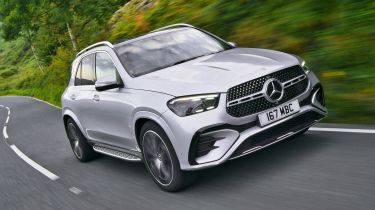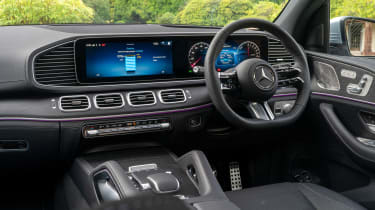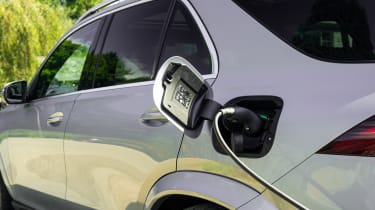Mercedes GLE 400e AMG Line review: plug-in hybrid SUV struggles in talented field
Mercedes take on the high-end plug-in SUV places more emphasis on EV attributes than its rivals – for better and for worse

Verdict
The new Mercedes GLE in 400e plug-in hybrid form has some impressive stats when it comes to its electric drive components and charging capability, but a grumbly internal combustion engine and clunky driving dynamics mean it doesn’t quite find the right balance. Unless you prefer to regularly top-up the battery with high-speed DC charging, BMW and Porsche have this end of the market sewn up.
If you’re in the market for a large luxury SUV and fancy the benefits that come with a plug-in hybrid powertrain, there are no shortage of premium brands willing to sell you a car that ostensibly fits the bill. Mercedes is one of them with a mildly refreshed GLE now on sale in new GLE 400e plug-in hybrid form and the brand can also offer the usual combination of mild-hybrid petrol and diesel options alongside. If you’re in the market for a full EV, there’s even the new EQE SUV, but for now we’re trying out that Goldilocks plug-in hybrid option.
Priced from £82,255, the standard GLE 400e AMG Line is marginally more expensive than its key BMW and Porsche rivals. It’s also available with the Premium and Premium Plus packages that add around £5,000 in each jump. Standard equipment for the base car is relatively good, with 20-inch wheels, leather seats, faux-leather trim for the door inserts and dashboard, a 360-degree parking camera, air-suspension and multi-beam LED headlights. The Premium pack adds elements like larger wheels, a glass roof and a head-up display, with the Premium Plus going one step on with massaging seats and four-zone climate control, but none of these elements are critical additions.
Used - available now

2023 Citroen
C4
22,694 milesManualPetrol1.2L
Cash £12,400
2023 Peugeot
3008
34,428 milesAutomaticDiesel1.5L
Cash £16,700
2022 Ford
EcoSport
42,584 milesManualPetrol1.0L
Cash £9,500
2023 Audi
Q4 e-tron
80,277 milesAutomaticElectric
Cash £17,600The GLE400e plug-in hybrid is based around a four-cylinder petrol engine, unlike the BMW X5 xDrive50e, Porsche Cayenne e-Hybrid and Range Rover Sport P460e equivalents, which all use six-cylinder units. This brings compromises in terms of outright performance, with a combined system output of 375bhp and 650Nm of torque – less than most rivals, and over 100bhp down on the BMW. The Mercedes is also less refined than the X5 when the petrol engine is up and running.
To compensate, the Mercedes has a larger battery pack than rivals (except the more expensive Range Rover), with a capacity of 31.2kWh. This is backed up by significantly faster charging capability - it’s able to be recharged on a DC rapid-charger at up to 60kW making a 10-80 per cent refill possible in just 20 minutes. The BMW and Porsche, by comparison, only allow for much slower AC charging that has their smaller battery packs taking hours, rather than minutes to recharge.
The the GLE400e’s outright electric range isn’t any longer despite the larger battery pack. It’s rated at around 60 miles from a charge which is on-par with the BMW and only slightly ahead of the Porsche. This is down to less impressive efficiency when running purely on its batteries, a byproduct of their Merc’s extra weight, among other things. By way of comparison, despite featuring bigger petrol engines, the Porsche and BMW both weigh around 200kg less than the 2,645kg Mercedes.
This has other ramifications for the driving experience, too. The e-motor has plenty of performance for low-speed driving, and will comfortably cruise at motorway speeds, but when the petrol engine is called on it will bark into life without much subtlety. By comparison, the BMW’s six-cylinder is almost imperceptible when it interrupts proceedings, only raising its voice when you call for full power.
The calibration of the GLE’s transitions between petrol and electric running is well considered and reactive to driver inputs but the petrol engine is just too unrefined, counting as a significant downmark for the whole experience.
Refinement elsewhere is generally good, though, as it rides well – even on the larger wheel options – and has very good insulation from wind and road noise. Brake pedal feel is also quite good for the class, and the Mercedes definitely has more adjustability and consistency than its plug-in rivals, which can often have an inconsistent or dead feeling brake pedal.
When roads get tighter, or if you want to up the pace, the GLE’s driving experience isn’t as nailed down as those of the BMW or Porsche, either. The extra few hundred kilograms of kerb weight make the GLE feel more ponderous and cumbersome to drive as the roads get twisty, and despite feeling planted at high speeds, the relatively fast steering ratio can feel out of step with the loose body-control.
There is a positive to the GLE’s mass, though, and it’s in the extra space afforded by the comparatively wide body. The second row has lots of leg, knee and headroom, with plenty of shoulder room to sit three adults abreast. The boot is also exceptionally large, with a wide and low opening that has 630-litres of space (130-litres more than the X5 for comparison).
When you’re in the cabin you can’t help but notice that due to almost no changes in the recent refresh, it feels a generation or so behind the class leaders. Its dual-screen setup is clean and Merc’s MBUX user interface is relatively easy to navigate with some prior exposure, but most rivals come with more modern features and slicker interfaces. Overall quality is only fine too, the GLE feeling less solid than the Cayenne and less plush than an X5.
In isolation the GLE400e is a good luxury SUV, with lots of space and a flexible powertrain that, if you regularly charge it up, works well in most situations. However the GLE sits in a very crowded and competent marketplace. BMW’s latest X5 plug-in is a stand-out both in terms of its superb powertrain and excellent comfort levels, while the Porsche Cayenne is more dynamic and feels better built. If you’re after ultimate luxury then the Range Rover Sport is also in the mix. It’s a similar price if you opt for one of the Merc’s upmarket Premium or Premium Plus trim levels.
In reality, the GLE’s only trump card seems to be its ability for fast DC charging. With the petrol engine more than flexible enough to support long journeys and a home charging point likely to be available to most owners considering the GLE’s price and market placement, this attribute is unlikely to sway many people. If it is a priority, then this might be the luxury SUV for you - for everyone else BMW and Porsche make a couple of deeply impressive alternatives.
| Model: | Mercedes-Benz GLE400e AMG Line |
| Price: | £82,255 |
| Engine: | 2.0-litre turbo-petrol, plug-in hybrid |
| Power/torque: | 375bhp/650Nm |
| Transmission: | Nine-speed auto, four-wheel drive |
| 0-62mph: | 6.1 seconds |
| Top speed: | 155mph |
| Economy/CO2: | 282mpg/22g/km |
| On sale: | Now |










